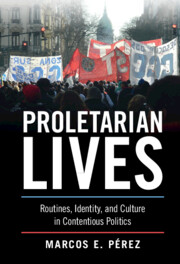Book contents
- Proletarian Lives
- Cambridge Studies in Contentious Politics
- Proletarian Lives
- Copyright page
- Dedication
- Contents
- Figures
- Acknowledgments
- 1 Introduction
- 2 “I Became a Bum”
- 3 “The Struggle Is on the Streets”
- 4 “I Know What It Means to Follow a Schedule”
- 5 “If It Rains or Hails, You Still Have to Show Up for Work”
- 6 “We Drink Mate, Eat a Good Stew, Talk … and That Way Time Flies”
- 7 “A Small Thing to Get By”
- 8 Conclusion
- Book part
- References
- Index
- Books in the Series (continued from p. iii)
6 - “We Drink Mate, Eat a Good Stew, Talk … and That Way Time Flies”
Protection of Communal Activities
Published online by Cambridge University Press: 24 March 2022
- Proletarian Lives
- Cambridge Studies in Contentious Politics
- Proletarian Lives
- Copyright page
- Dedication
- Contents
- Figures
- Acknowledgments
- 1 Introduction
- 2 “I Became a Bum”
- 3 “The Struggle Is on the Streets”
- 4 “I Know What It Means to Follow a Schedule”
- 5 “If It Rains or Hails, You Still Have to Show Up for Work”
- 6 “We Drink Mate, Eat a Good Stew, Talk … and That Way Time Flies”
- 7 “A Small Thing to Get By”
- 8 Conclusion
- Book part
- References
- Index
- Books in the Series (continued from p. iii)
Summary
This chapter analyzes the third mechanism for participation in working-class routines: protection. The expansion of unemployment undermined the material conditions for a number of established routines in working-class neighborhoods: Community spaces decayed, drug use became rampant, and interpersonal violence skyrocketed. Hence, wholesome habits associated with communal life (such as spending time in common spaces and sharing resources with neighbors) are perceived to be endangered. In this context of individual and collective deprivation, organizations become oases of socialization where interpersonal trust and altruism is still possible. The chapter concludes by showing how, just like reconstruction and development, protection of routines is a gendered process. It outlines this effect by describing the role of two typical shared tasks within piquetero groups: the male-dominated “security teams” in charge of self-defense; and the “milk cups”, soup kitchens for minors that are almost entirely run by women.
Keywords
- Type
- Chapter
- Information
- Proletarian LivesRoutines, Identity, and Culture in Contentious Politics, pp. 126 - 159Publisher: Cambridge University PressPrint publication year: 2022

